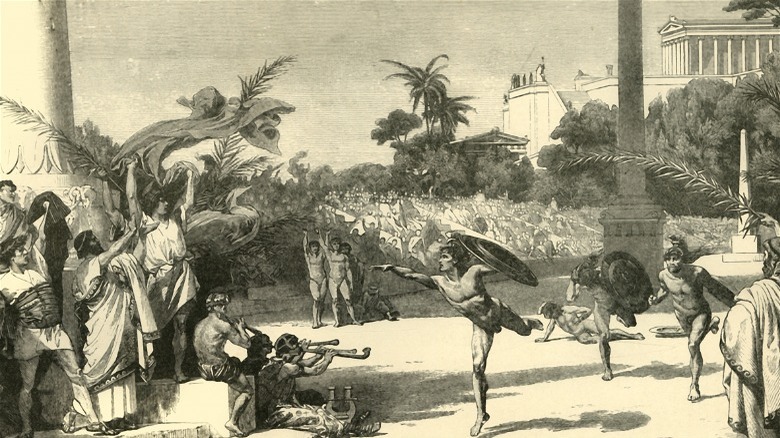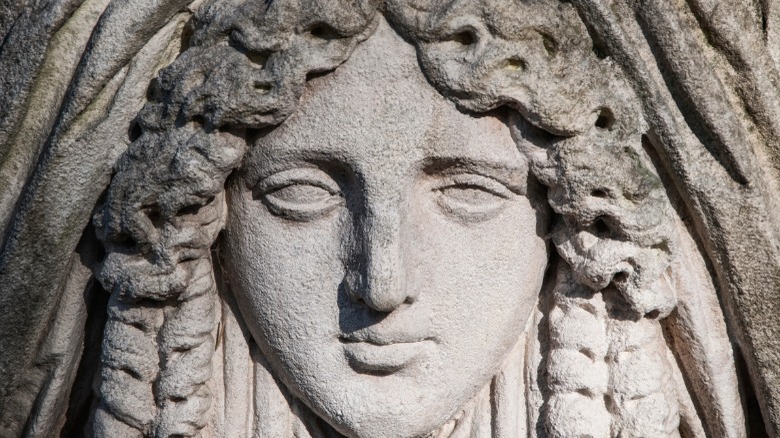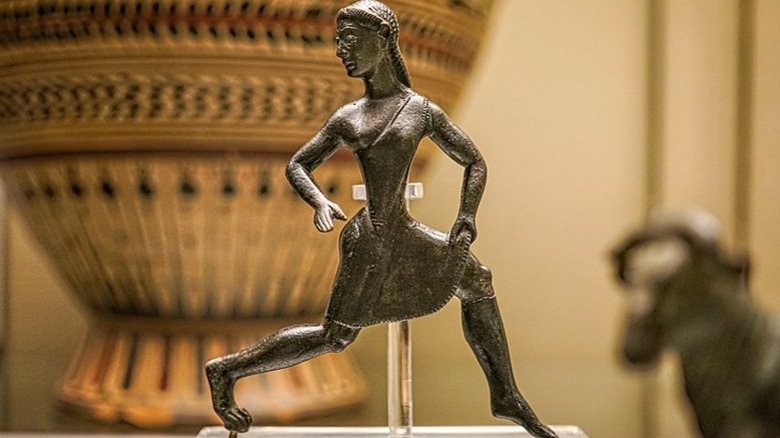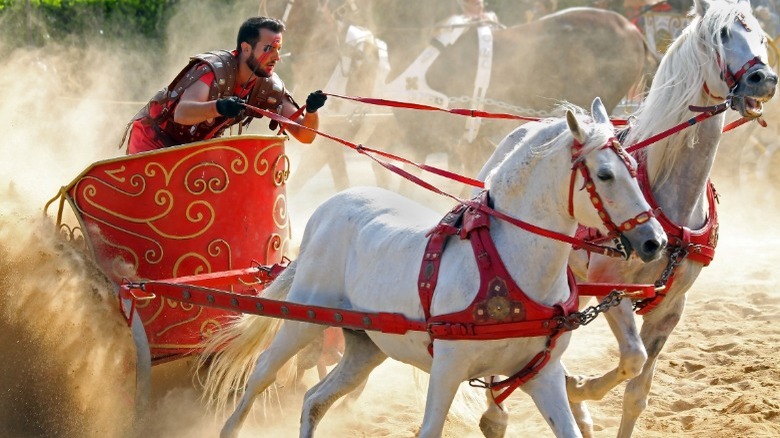The History Of The Heraean Games, Womens' Ancient Olympics
Our modern society was built upon the accomplishments and advancements of the civilizations that came before us. The concept of paper came from the Egyptians, while substances like concrete can be attributed to the Romans (per History). Additionally, the Greeks are often credited with ideas of democracy and philosophy, as well as advancements in literature, art, and medicine. However, one of their most well-known contributions to the modern world is organized and competitive sports.
The Olympics as we know them today is an international competition that generally takes place every four years and consists of both winter and summer games. The original idea for this series of competitions is much older and dates back to ancient Greece. Though today we just have the winter or summer games — where men and women are allowed to participate — the Greeks had many different competitions in honor of their gods, and generally, only men were allowed to participate. This tradition is believed to have changed with the Heraean Games.
History of Ancient Competition
According to History, the first organized Olympic Games took place in 776 B.C. and spawned the idea of athletic competition in giant arenas full of spectators. It was at this point that people also began to admire their favorite athletes almost to the point of obsession, making them some of the world's first celebrities. It was believed that these athletes possessed "special powers," and it was rumored that even statues of their likeness had healing powers.
Initially, the Greeks had individual competitions and only allowed men to compete. Some of the sports that these athletes competed in — such as boxing, running, wrestling, and the pentathlon — are familiar to us today. In fact, some of those events are still a part of the modern Olympic Games. There were also events such as chariot racing and a sport known as pankration, an ancient version of mixed martial arts that are not a part of the modern Olympiads. The athletes that participated in these were highly revered and expected to be the walking embodiment of excellence.
Origins of the Heraean Games
As women were not even allowed to be present at Olympic competitions and others like it, if they wanted to participate in athletics, they needed to have their own. There are few records that exist that discuss the Heraean Games, but they reportedly took place following the first formal Olympics of 776 B.C. (per the Greek Reporter). In similar fashion to the Olympic Games, the Heraean Games were held in the stadium in Olympia and were four years apart.
This series of athletic competitions was named in honor of the Greek goddess Hera, and most participants were young women. Participation in the Heraean Games was also reportedly somewhat of a "rite of passage" for these young ladies as they transitioned into adulthood. According to Health & Fitness History, there is no official end date for the Heraean games, but some suggest that it could have been around the time that such games and festivals were outlawed by Emperor Theodosius.
Women In Ancient Sport
In ancient Greece, women's roles in society were different from ours today. According to World History, they had very limited rights when compared to the men of the day — they could not vote or own land and were mostly limited to being home and making babies. When they were young, if their family was of means, they were educated before often being married off by their fathers. Despite these potential limitations, one thing that was actually an important part of being a Greek woman was athleticism and strength.
While they may have been separated from their male counterparts, women were not necessarily forbidden or even discouraged from participating in sports (per Atlas Obscura). In fact, physical fitness was a respected and even desirable trait in women in ancient Greece. Spartan women in particular were known for their dedication to fitness and athleticism, believing that it resulted in healthy children. But though there were strong and healthy women having their own competitions on a regular basis by the first century, women still were not allowed to participate in the Olympics.
Sports of the Heraean Games
Though the details surrounding the Heraean Games can be a bit unclear, there are first hand accounts that describe the sports that the young women participated in. According to Health & Fitness History, Greek geographer Pausanias states that the early Heraean Games consisted of mostly running events. This was in great contrast to the men's contests, which included contact sports like boxing and wrestling.
The women's sports that Pausanias mentioned included stadion, diaulos, hippios, and dolichos (per Greek Reporter). The first of these races, the stadion, was a short race that would be comparable to the 200-meter race in today's competitions. Both the diaulos and hippios were consecutive races — the diaulos being two sprints along the stadium's track and the hippios four sprints across the stadium. The last race, the dolichos, was an endurance race of about 3 miles around the stadium. Winners of their respective races would receive a crown of olive leaves and meat that had been sacrificed to Hera. They would also be afforded an opportunity to inscribe their names on her temple.
Legend of Cynisca of Sparta
One of the legends that has been heavily associated with the Heraean Games is that of Cynisca of Sparta. As previously mentioned, Spartan women in particular believed physical fitness to be very important. According to the Greek Reporter, these women were even afforded more freedom than their other Greek counterparts and were known for their strength and athleticism.
Cynisca of Sparta managed to become the first woman to win an event at the men's Olympics (per World History). She was the daughter of Sparta's King Archidamas II, and in 396 B.C. and 392 B.C., she entered her horses into the chariot races. Though she did not actually drive the horses herself — it was common practice to employ a jockey — her chariot won both times, technically making her the first female Olympic champion. She was honored with statues and monuments following her victory. These monuments erected in celebration of her accomplishments were also the first of their kind to be dedicated to a woman in pan-Hellenic competition.





